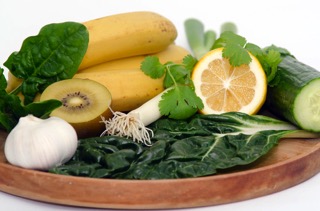
One of the many downsides to a modern junk food diet low in vegetables is that it makes your body too acidic. The human body must maintain a healthy pH for optimal cellular function. When it’s too acidic, diseases take root.
A body that is overly acidic sets the stage for obesity, diabetes, heart disease, chronic pain, inflammation, autoimmune disease, and other chronic health problems.
Fortunately, you can sway your body toward a more healthy and alkaline pH through your diet.
Symptoms of being too acidic
Many people are too acidic but are not aware of it. Below are common symptoms of over acidity:
- Swelling and bloating
- Frequent urination
- Poor brain function
- Brain fog
- Salt cravings
- Muscle cramps
- Muscle twitches
- Constipation
- Reduced endurance for exercise
- Difficulty holding breath
- Rapid, shallow breathing
- Poor sleep
Testing how acid or alkaline you are
People use several different methods to identify pH levels, but not all are reliable. The most well-known test is a salivary pH test, however this method does not have much support in scientific studies.
Testing blood pH is also not accurate because it only fluctuates in events such as poisoning, kidney disease, or lung disease. However, looking at functional medicine blood ranges of CO2 and anion gap can help identify a pattern of over acidity.
Urine testing has shown to accurately reflect how acidic or alkaline you are. It can also help you assess whether dietary changes, such as eating more leafy green veggies and less sugar, are helping you become more alkaline.
Ideal urinary pH is between 7.2-7.8. Please note, however, that infections, bacterial overgrowth, dehydration, incontinence, and other issues can affect your results.
How do you become more alkaline?
The modern American diet makes it easy to become too acidic. Sugars, processed starches, industrialized oils, and junk foods promote excess acidity.
Excess caffeine, sodas, and alcohol also promote acidity, as does too much meat and not enough colorful vegetables and fruits.
You do not need to become a vegan or vegetarian to maintain good alkalinity, however your diet should be based primarily on leafy green and colorful vegetables and low-glycemic fruits.
An alkaline diet is rich in magnesium, potassium, calcium, and other minerals that help maintain a healthy pH.
An added bonus: A plant-rich diet also feeds the right kind of bacteria in your gut so that you are less prone to food sensitivities, enjoy better brain function, and better immune function.
Avoid an alkaline stomach
The stomach needs to stay strongly acidic in order to digest proteins and fight pathogens. Many people suffer from insufficient stomach acidity, which paradoxically causes symptoms of acid reflux. Taking supplemental hydrochloric acid (as long as you don’t have ulcers) can actually help promote a healthy pH.
Health conditions that promote being too acidic
While being overly acidic can promote poor health, certain health conditions can likewise promote acidity. These include anemia, asthma, low blood sugar (hypoglycemia), or high blood sugar (insulin resistance or diabetes).
Acidity that is too severe becomes life threatening. Diabetes, kidney disease, and lung disease acidify the body to a severe degree and require medical attention.
Contact my office for ideas on how diet and nutritional therapy can help improve alkalinity and health.



Latest from the Blog
Autoimmune Disease Management with EBOO Therapy
July 17, 2024Autoimmune diseases, characterized by the immune system attacking the body’s own tissues, present significant challenges in treatment and management. Extracorporeal Blood Oxygenation and Ozonation (EBOO) therapy offers a promising adjunctive approach to managing autoimmune conditions. Functioning similarly to a dialysis machine, EBOO filters the blood to remove toxins and pathogens that may trigger autoimmune responses. […] Read more
Latest from the Blog
Detoxification and EBOO Therapy: Optimizing Cellular Health
Detoxification plays a crucial role in maintaining optimal health in today’s toxin-laden environment. Extracorporeal Blood Oxygenation and Ozonation (EBOO) therapy offers a sophisticated approach to detoxifying the bloodstream and enhancing overall well-being. Operating similarly to a blood filtration system, EBOO effectively removes toxins, pesticides, and chemicals that accumulate in the body, supporting the body’s natural […] Read more